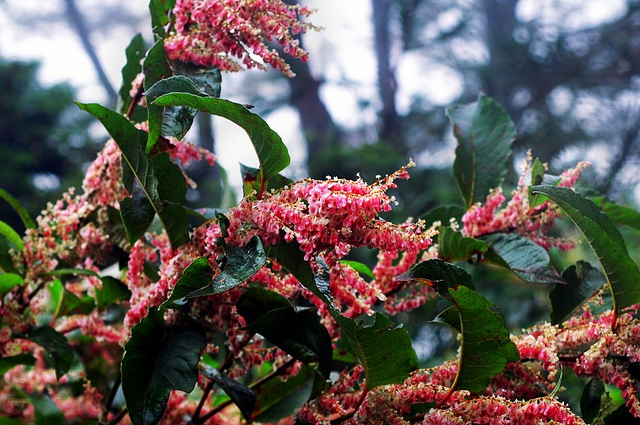
Profile
- Latin Name: Polygonum Cuspidatum
- CAS No.: 501-36-0
- Active Ingredient: Resveratrol
- Specifications: 10%-15%-20%-40%-50%-90%-95%-98%-99% Resveratrol
- Part Used: Root
- Test Method: HPLC
- Appearance: White powder
Description
The Polygonum Cuspidatum (Fallopia Japonica), commonly known as Japanese knotweed, is a large, herbaceous perennial plant of the family of Polygonaceae, native to East Asia in Japan, China and Korea. Japanese knotweed has hollow stems with distinct raised nodes that give it the appearance of bamboo., though it is not closely related. While stems may reach a maximum height of 3-4 m (9.8-13.1 ft) each growing season. It is typical to see much smaller plants in places where they sprout through cracks in the pavement or are repeatedly cut down. The leaves are broad oval with truncated base. The flowers are small, cream or white, produced in erect racemes in late summer and early autumn.
The resveratrol is the main active ingredient of Polygonum Cuspidatum Extract, Resveratrol is a type of natural phenol, produced naturaly by several plants in response to injury or when the plant is under attack by pathogens such as bacteria or fungi. Foods sources of resveratrol include the skin of grapes, blueberries, raspberries and mulberries. As of 2015, there is limited evidence of health effects in humans, Resverattrol has been discovered to have strong antioxidant activity. It has been shown to reduce the oxidation of LDL cholesterol, total cholesterol and the risk of cardiovascular disease. There have numerous studies that show the benefits of moderate red wine consumption on health and some studies suggest that the intake of red wine (and therefore resveratrol) may yield cholesterol-lowering effects.
Benefits
- Positive effect on cardiovascular system
- It Nourish and protect liver
- Impact on the metabolism of osseous issue
- Anti-oxidant and quench free-radicals
- Anti-bacterial and anti-fungal effect.

